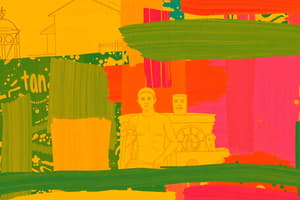Podcast
Questions and Answers
Which of the following best describes the significance of 'uomo universale' during the Renaissance?
Which of the following best describes the significance of 'uomo universale' during the Renaissance?
- It referred to the ideal of a person skilled in only oratory and rhetoric.
- It symbolized the ideal of a well-rounded individual with expertise in various fields. (correct)
- It emphasized the importance of _vita contemplativa_ over _vita activa_.
- It represented the belief that all knowledge should be public property, accessible to everyone.
How did Peter Ramus alter Cicero's Five Classical Canons of Oration?
How did Peter Ramus alter Cicero's Five Classical Canons of Oration?
- By reorganizing the canons to better reflect the Renaissance focus on artistic expression.
- By expanding the canons to include new elements of rhetorical theory.
- By emphasizing the importance of epistemic power in rhetoric.
- By stripping rhetoric of its epistemic 'power' and redefining the function of each canon. (correct)
What was René Descartes’s view on rhetoric?
What was René Descartes’s view on rhetoric?
- He believed it was essential for exploring the range of human knowledge.
- He thought rhetoric was necessary for achieving eloquence.
- He saw it as a valuable tool for understanding probabilities and beliefs.
- He regarded it with suspicion because he prioritized certain knowledge. (correct)
How does the concept of 'vita activa' contrast with 'vita contemplativa' as understood by Lorenzo Valla?
How does the concept of 'vita activa' contrast with 'vita contemplativa' as understood by Lorenzo Valla?
What characterizes the focus of the Enlightenment (Continental Europe) concerning knowledge and epistemology?
What characterizes the focus of the Enlightenment (Continental Europe) concerning knowledge and epistemology?
What did John Locke emphasize as crucial for obtaining certain knowledge?
What did John Locke emphasize as crucial for obtaining certain knowledge?
In the context of the Scottish Enlightenment, what is the significance of Alan Monroe's Motivated Sequence?
In the context of the Scottish Enlightenment, what is the significance of Alan Monroe's Motivated Sequence?
What does the term 'perfectus orator' imply about the ideal orator?
What does the term 'perfectus orator' imply about the ideal orator?
How did George Campbell define eloquence?
How did George Campbell define eloquence?
What was Cicero trying to 'marry' through his vocations?
What was Cicero trying to 'marry' through his vocations?
Flashcards
Uomo Universale
Uomo Universale
The ideal of the 'universal person,' someone skilled in many areas.
La Rinascita
La Rinascita
The rebirth; a period of renewed interest in classical art and literature.
Oratory
Oratory
The art of effective or persuasive speaking or writing.
Cicero's vocations
Cicero's vocations
Signup and view all the flashcards
Episteme
Episteme
Signup and view all the flashcards
Five Classical Canons of Oration
Five Classical Canons of Oration
Signup and view all the flashcards
George Campbell's definition of eloquence
George Campbell's definition of eloquence
Signup and view all the flashcards
Alan Monroe's Motivated Sequence
Alan Monroe's Motivated Sequence
Signup and view all the flashcards
Study Notes
-
The review sheet is for COMM 1014, Introduction to Communication, Spring 2025, Exam #1
-
Use this review sheet and Quiz #1 review sheet to prepare for Exam #1
-
Terms to know:
- perfectus orator: the perfect orator
- vir bonus, dicendi peritus: a good person speaking well
- uomo universale: universal person
- humanitas: humanity, refinement, culture
- vita contemplativa: contemplative life
- vita activa: active life
- ratio & oratio: reason and oration
- episteme: knowledge, science
- epistemic "power": the power to know
-
People to know: Cicero, Quintilian, Lorenzo Valla, Peter Ramus, Rene Descartes, John Locke, George Campbell, Alan Monroe
-
Definitions and Descriptions to know: Quintilian's definition of "oratory," Ramus's description of "speech," Locke's descriptions of rhetoric, George Campbell's definition of eloquence.
Rome & Rhetoric
- Cicero's vocations were legal and political
- Cicero's reputation was as a legal and political orator
- Cicero tried to "marry" legal and political skills with oratory
The Five Classical Canons of Oration
-
Invention (developing arguments)
-
Arrangement (organizing arguments)
-
Style (choosing effective language)
-
Memory (remembering and delivering speeches)
-
Delivery (presenting speeches effectively)
-
Quintilian defined "oratory"
-
Quintilian had a reputation as a teacher of oratory, public speaking, and rhetoric
The Renaissance & Rhetoric
-
La Rinascita means "rebirth"
-
The ideal of the uomo universale (universal person) was important
-
Lorenzo Valla contrasted the vita contemplativa (contemplative life) with the vita activa (active life)
-
Valla and other Italian humanists considered certain things to be "public property"
-
Valla had views on human duties
-
Peter Ramus changed Cicero's "Five Classical Canons of Oration"
-
Ramus described "speech"
-
Ramus stripped rhetoric of its epistemic "power"
The Enlightenment (Continental Europe) & Anti-Rhetoric
-
People's interest in "knowledge" (epistemology) focused on probabilities, opinions, and beliefs
-
Rene Descartes emphasized obtaining certain knowledge
-
Descartes distrusted rhetoric
-
John Locke emphasized obtaining certain knowledge
-
Locke disliked rhetoric
The Scottish Enlightenment (Scotland)
- George Campbell defined "eloquence"
- Abilities are held in the human psyche (mind)
- Alan Monroe created the Motivated Sequence
- Know the steps in Alan Monroe's Motivated Sequence
Studying That Suits You
Use AI to generate personalized quizzes and flashcards to suit your learning preferences.
Related Documents
Description
Review sheet for COMM 1014, Introduction to Communication, Spring 2025, Exam #1. Key terms include perfectus orator, vir bonus dicendi peritus, and uomo universale. Key figures to know are Cicero, Quintilian, and Peter Ramus. Definitions include Quintilian's definition of oratory.




